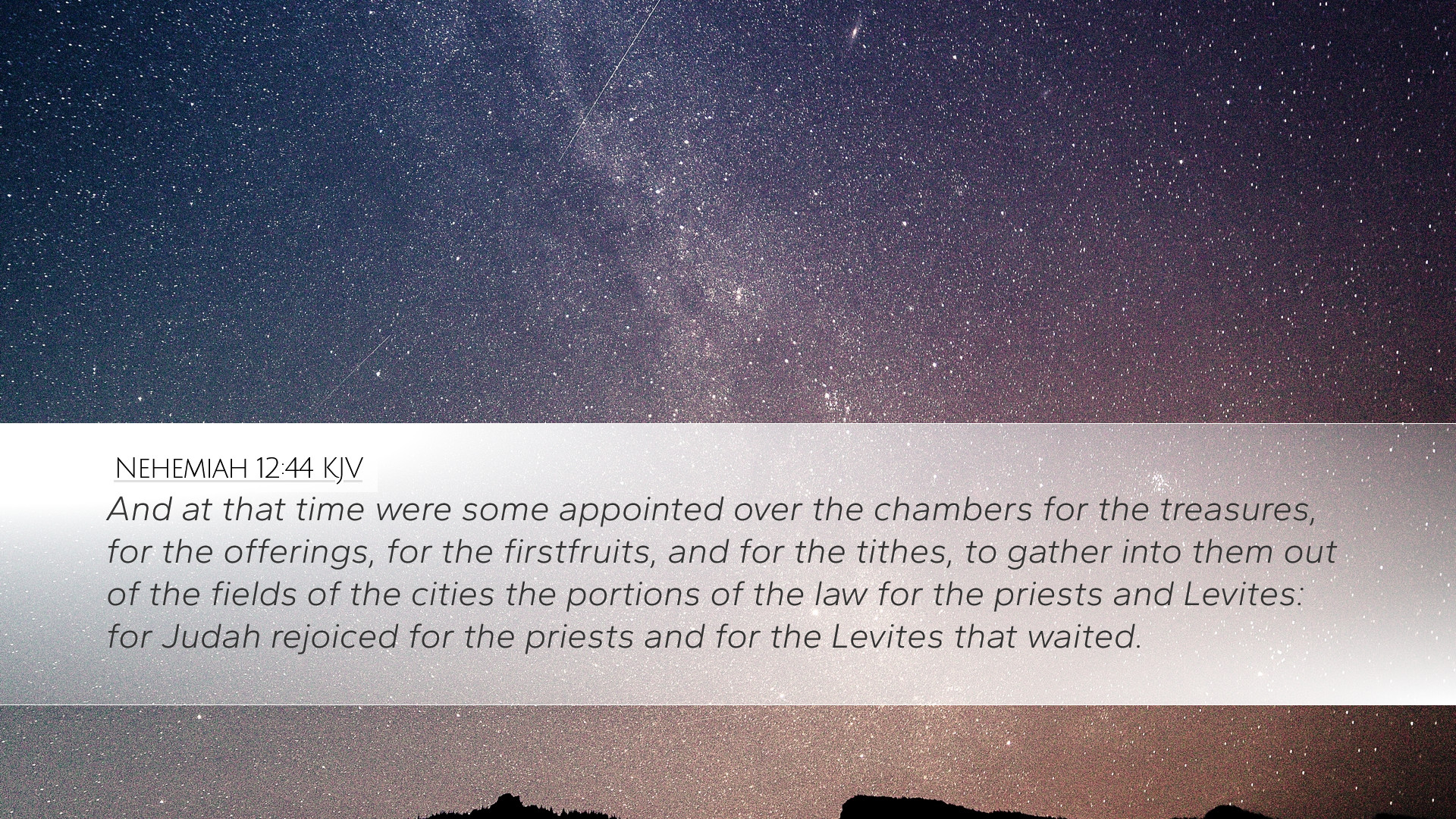Commentary on Nehemiah 12:44
Verse Overview: Nehemiah 12:44 states, “And at that time were some appointed over the chambers for the treasures, for the offerings, for the first fruits, and for the tithes, to gather into them out of the fields of the cities the portions of the law for the priests and Levites: for Judah rejoiced for the priests and for the Levites that waited.” This verse encapsulates a vital moment in the restoration of Jerusalem, where proper provisions for temple worship and the maintenance of the priestly duties are established.
Contextual Background
Following the return of the exiles from Babylon, Nehemiah undertakes the immense task of rebuilding both the physical walls of Jerusalem and the spiritual lives of its people. This chapter highlights a significant moment of organization and dedication of the temple and the services therein.
Historical Significance
Matthew Henry emphasizes that the organization of the priests and Levites in this verse reflects the careful restoration of the worship practices central to the Israelite identity. With the walls rebuilt, the focus shifts to spiritual restoration, signifying a return to covenant faithfulness.
Key Observations from Public Domain Commentaries
-
Appointment of Treasures:
Albert Barnes notes the importance of appointing individuals to oversee offerings and treasures. This administrative task shows a commitment to proper stewardship and responsible financial management in relation to the temple's needs.
-
The Chambers for Treasures:
Adam Clarke explains that these chambers were essentially storages set aside for the gifts and sacrifices brought to the temple. They were critical for ensuring that the priests and Levites could receive their due portions promptly, which was essential for their livelihood.
-
Gathering Portions of the Law:
Henry elaborates on the collection of tithes and first-fruits as reverent acts of worship. These practices were established by the Law of Moses, reinforcing the covenantal obligations of the Israelites.
-
Judah's Rejoice:
The joy of Judah mentioned signifies a community deeply appreciative of its leaders' dedication to spiritual integrity. The priests and Levites serve not just as ministers but as vital links to their heritage and identity.
Spiritual and Theological Insights
This verse and its context provide profound insights into the theology of worship and service within the community of faith:
1. The Centrality of Worship
In Nehemiah's era, worship was paramount to national identity. The reorganization of the temple services indicates a revival of both individual and communal connection to God. As Henry explains, “Without the priests and Levites properly supported, worship would falter.” Likewise, this emphasizes the church today — proper administration and support are crucial for a thriving ministry.
2. The Role of Financial Stewardship
Barnes points out that in establishing chambers for treasures, Nehemiah sets an example of how ministry requires sound financial practices to ensure sustainability. The biblical principles of tithing and first-fruits highlight God’s ownership over all and man's obligation to return to Him a portion of what he receives.
3. Community Involvement and Joy
The rejoicing of Judah over the proper handling of temple offerings illustrates the joyful nature of worship and community involvement in God’s work. As Clarke notes, there is an inherent joy in participating in God’s kingdom endeavors which fosters unity and collective responsibility among the people.
Such vitality is vital for contemporary churches, as pastors and leaders encourage congregants to actively support and participate in church ministries.
Applications for Today's Church
The principles gleaned from Nehemiah 12:44 are applicable for modern church governance and ministry. The establishment of trustworthy and wise leaders over church finances and resources is essential for spiritual health:
-
Importance of Leadership:
As appointed leaders are crucial for overseeing church resources, congregations should seek leaders of integrity, accountability, and a strong biblical foundation.
-
Emphasizing Generosity:
Teaching on tithes and offerings should not be merely transactional but should reflect genuine worship and gratitude towards God’s provision.
-
Community Culture:
Encouraging a culture of joy in stewardship and worship helps a congregation to thrive spiritually and financially, as they celebrate God’s work in their midst.
Conclusion
Nehemiah 12:44 provides a profound insight into the administration of sacred responsibilities and the joy of community worship. Through the lens of historical context and theological implications, this verse reminds us of the importance of dedicated service, proper stewardship, and the collective joy found in worshiping God together. It calls on pastors, theologians, and believers alike to reflect on their own stewardship and worship practices in light of these foundational truths.


